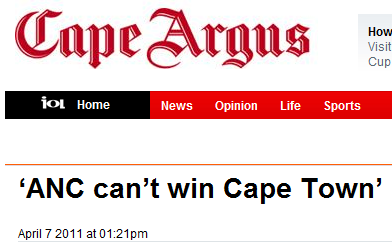Possibly, anyway.
If you’re from these parts, you’ll have no doubt seen the Cape Party’s election boards on streetlights all over Cape Town. They got them up early, presumably to catch those voters who, rather than making their decisions on party policies, manifestos and the like, thought “I know, I’ll vote for the first party whose election boards I see on the streetlights on my way home this evening.”
It’s like taxi companies who try to be first in the Yellow Pages by calling themselves “A1 Taxis” or “AAA Cars” in the hope that you’ll pick them because they are top of the list. I have a deep mistrust of these companies – what are they trying to hide? Would booking with a taxi company with a name beginning further down the alphabet really be a worse option for my travelling requirements? Why?
But back to the Cape Party and their early-bird advertising tactics. It’s a small number of voters that will be influenced in this way, but then the Cape Party appears to be a party of small numbers anyway.
So why should we be bothered about them at all? Well, the Cape Party wants the Cape Provinces to become independent, becoming a new country: The Cape Republic.
The Cape Party will return the Cape to its rightful independence and once and for all bring an end to the racism and oppression suffered under this colonial Union.
Which sounds “ok”, I guess.
And their manifesto lists several reasons why this would work, including some recent “successful examples”:
…we have a long history of not being a part of South Africa. Many people believe that South Africa has passed the tipping point and that Independence for the Cape is the only viable solution.
Successful examples: former USSR (15 countries), Yugoslavia (7 Countries), Czechoslavakia [sic] (2 countries) and the peaceful secession of South Sudan only a month ago.
They do seem to be ignoring conflicts in Georgia, the ongoing crisis in Chechnya and the tiny, almost insignificant Yugoslav wars of the 1990s (conservative estimates of 120,000 deaths). There was violence before, during and after the Sudanese referendum.
Dividing up Czechoslovakia seemed to go quite well though. Let’s hope that the Cape can follow that road to independent governance rather than any of those other “successful” examples, hey?
But their blatant glossing over of the truth behind what actually happened when those countries went their separate ways is not my real issue with these guys: after all, the definition of success is subjective. My real problem is the fact that they are secretly trying to turn the Cape into France. Check the party emblem and compare the shape of the new Cape Republic to… France:


OK, Normandy is a bit out of proportion, but that Southern coast looks dangerously familiar.
It was because of this concerning similarity that I looked into the Cape Party in greater detail. And look what I found as the very first line in their Vision for The Cape Republic:
The Cape Republic is roughly the size of France
Oh – isn’t that convenient???
So we look like France and we’re about the same size as France. Now all that is needed is an hatred of the British because you once lost a war to them.
The selfish motives of politicians a political system that is as racially divisive and oppressive as the others that have plagued this land since the British Empire forced the Union of South Africa upon us in 1910…
Bingo.
Further evidence: constant references to Cape Provence and suggested adoption of the Swiss system of voting – a country where they speak French and which borders France. In addition, the Cape Party headquarters is in Franschhoek. Need I say more, except for informing you that I actually made this last bit up – they’re actually based in Claremont. Which sounds very much like Clermont-Ferrand, which is in France.
The Cape Party manifesto ends with this quote from Mahatma Ghandi:
First they ignore you. Then they laugh at you. Then they fight you. Then you win.
Look, I’m already well into stage two, but more fool them for revealing their modus operandi as I have no plans to go any further, breaking the chain and thus ruining any chances of them winning anything ever.
And that is a good thing, because turning into France is no decent future for us.
Or anyone else for that matter.
Good People of the Cape, while it may improve the overall quality of the cuisine in this corner of Africa, this is scant reward for the annoying accents, dismissive arrogance, constant and overwhelming scent of garlic and terrifyingly bizarre toilet habits which we will be forced to endure if the Cape Party ever get their way for this little bit of Europe. You have been warned.







